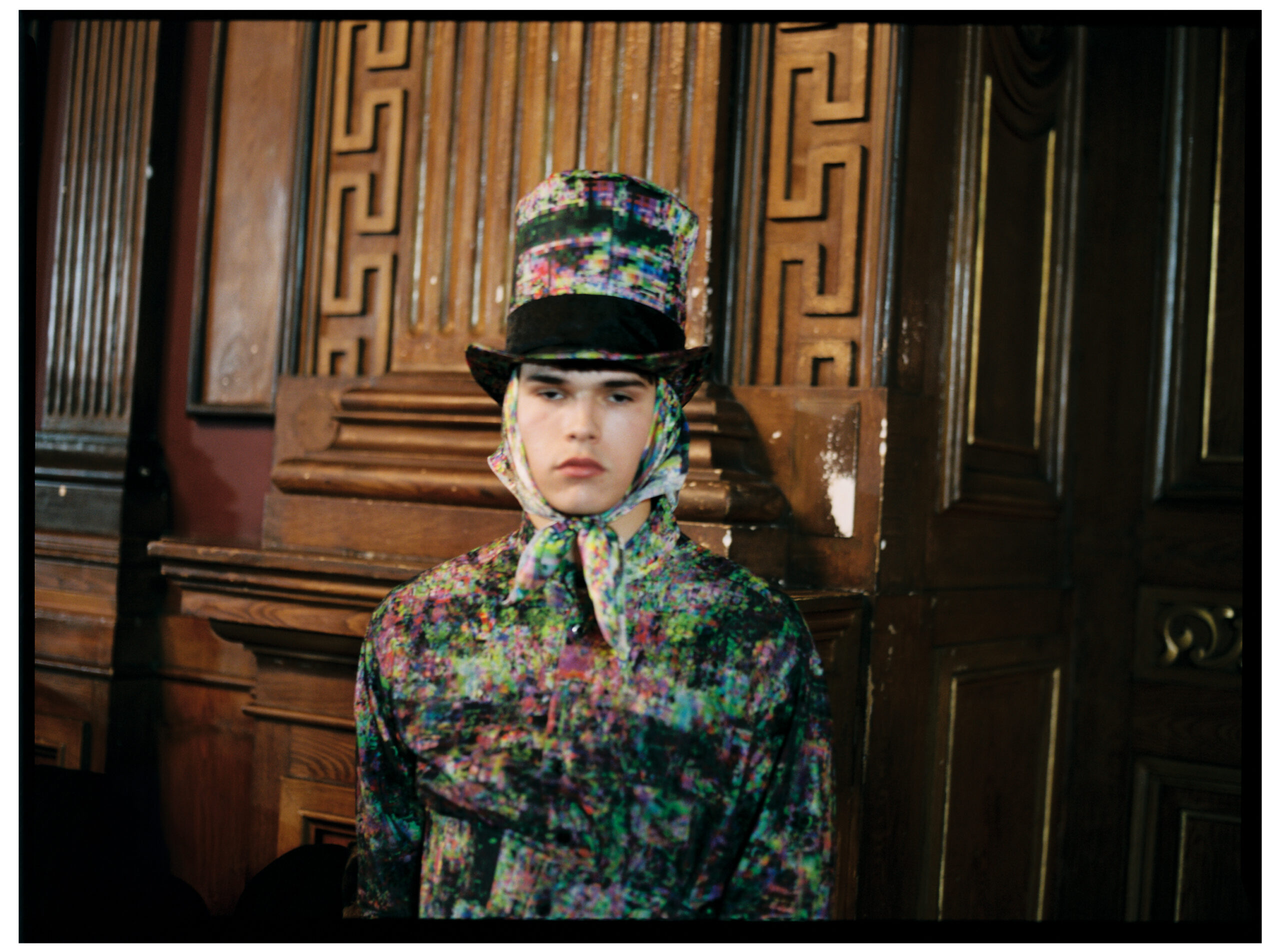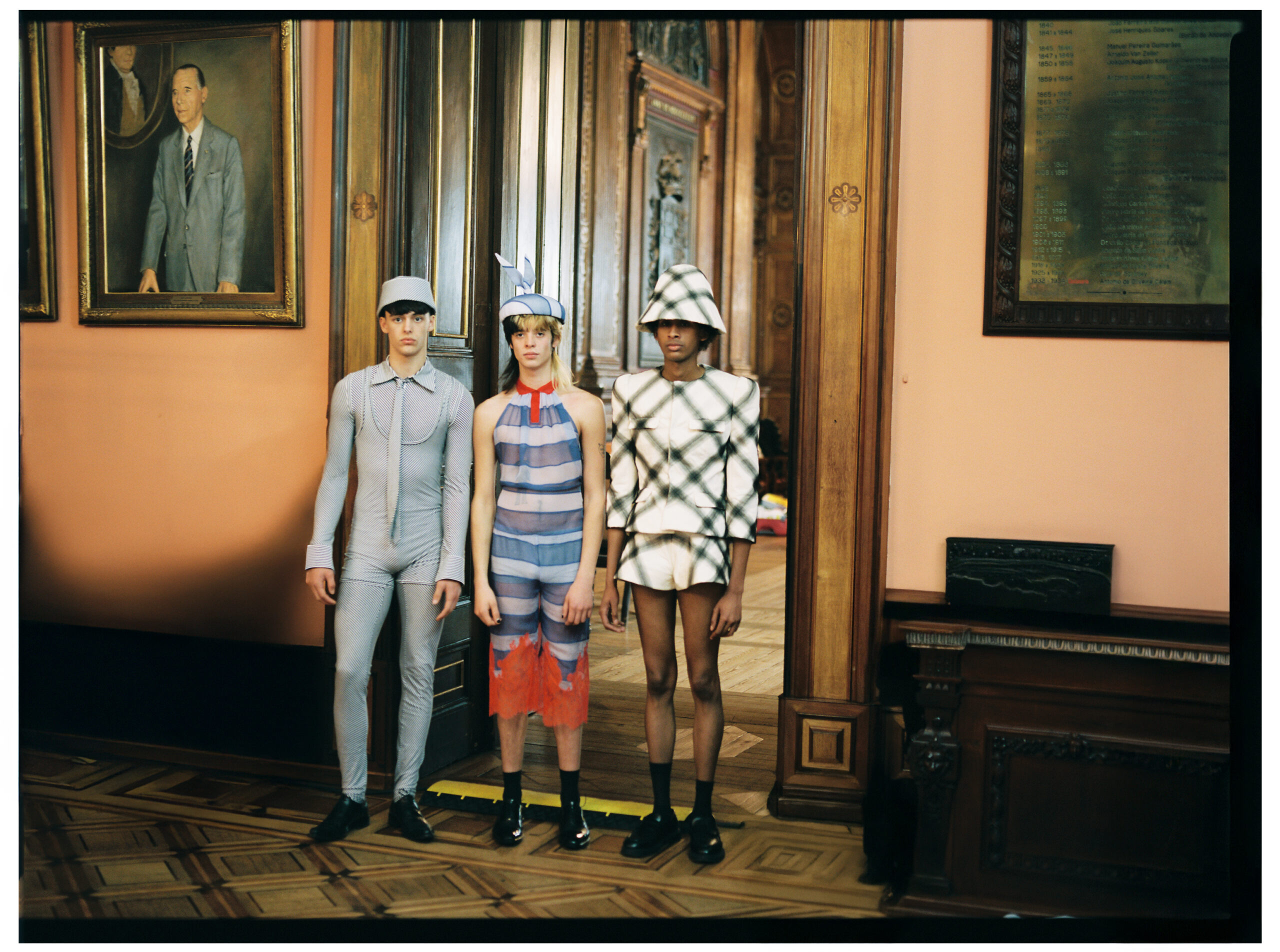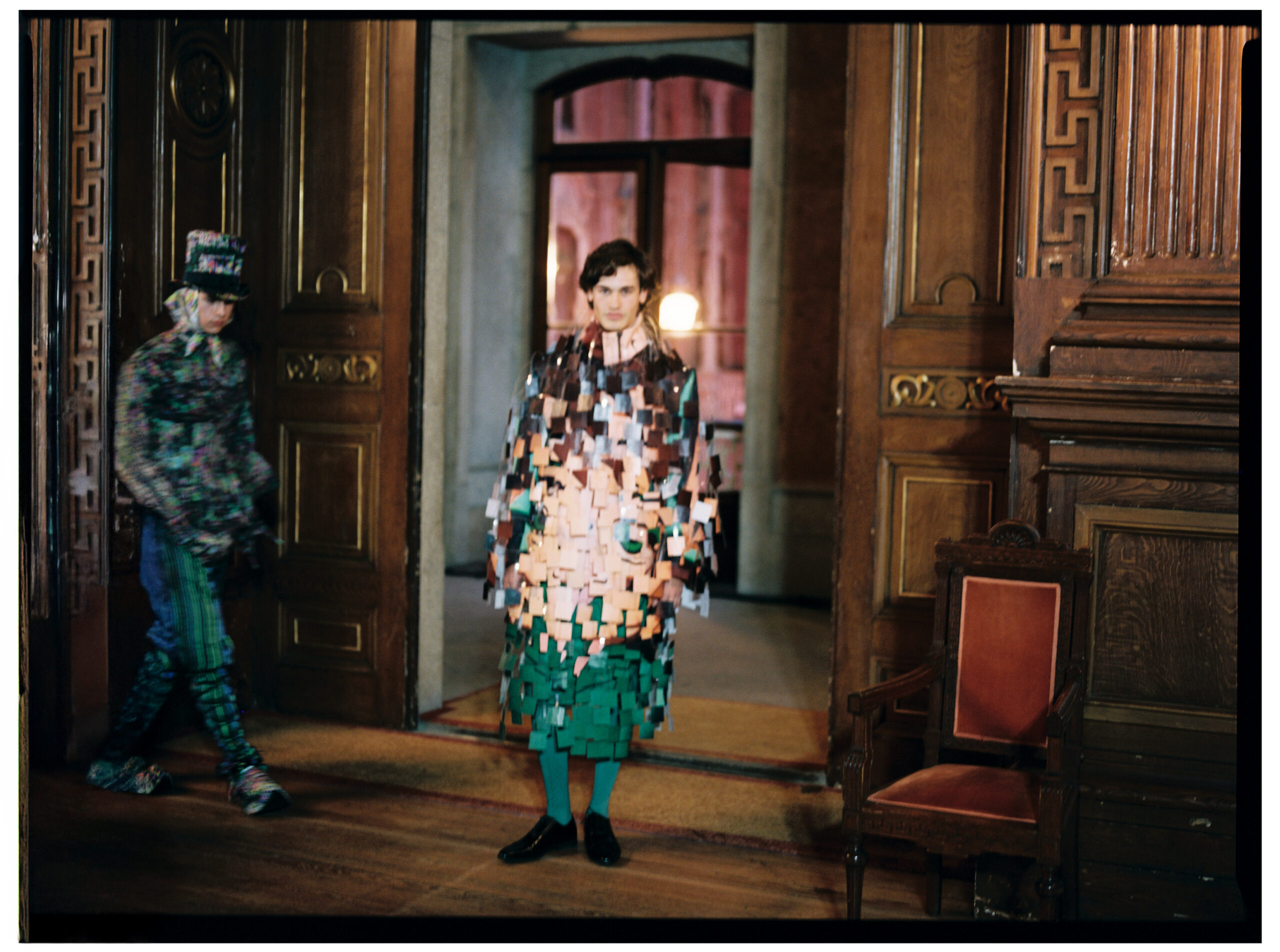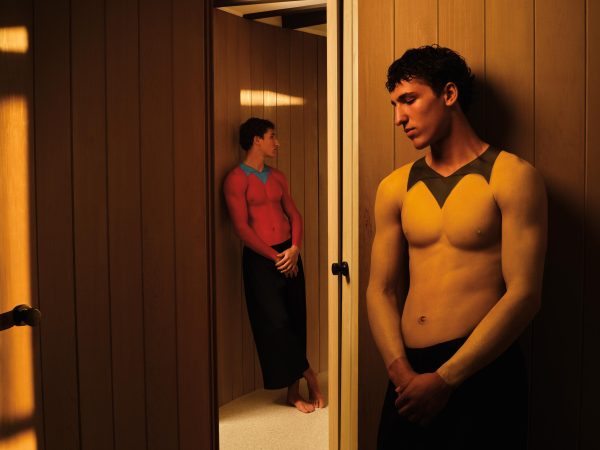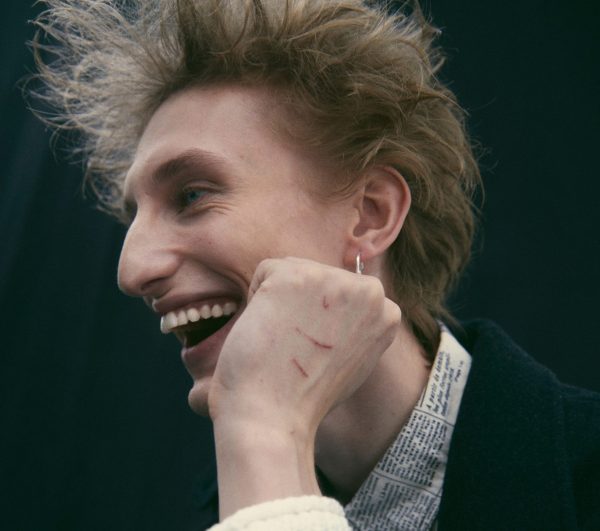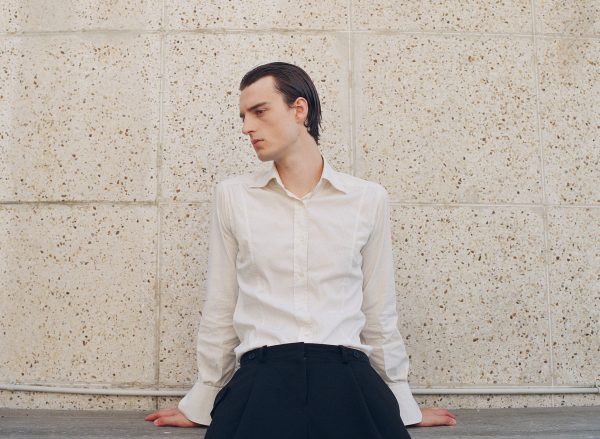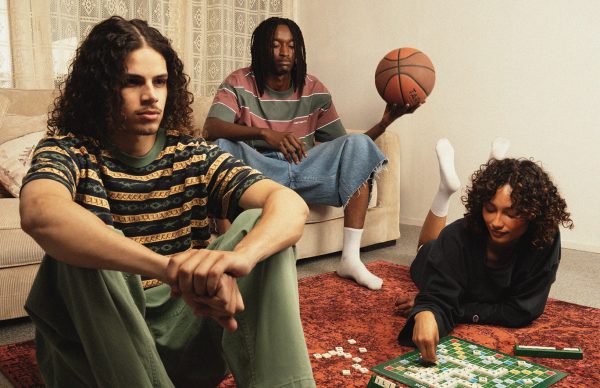Designer Vittorio Liccardo keeps his history close to his heart for his most recent collection. Coming from a family deeply tied to the Neapolitan shoemaking tradition, craftsmanship and care are present at the core of Liccardo’s being. It is with this care that he presents “Pausilypon,” a collection formed of recycled materials from his family’s firm.
Liccardo is a native of Naples, though he is a recent graduate of Polimoda in Florence. Still, Naples can be found throughout this collection, present in not only the materials and diversity of influences but in the name itself. According to Liccardo, the word “pausilypon” can be interpreted as “relief from pain.” It also happens to be the name of Naples’ Posillipo quarter — noting the history of the region as a place of retirement and recuperation.
For the accompanying photo series, Liccardo teamed up with photographer Fabiana Privitera to present his work with a punk poise. All pieces in the photos were designed or altered by the designer, including the shoes which have been modified heavily by Liccardo. Here, Schön! speaks candidly with Liccardo about this collection and photo series.
What is your history in design?
Since childhood, I’ve always been fascinated by art, fashion, architecture and the ways they fuse together, creating unique pieces that speak without words. Thanks to my experience in Polimoda, I’ve learned that design is an evolving language that adapts to our needs and describes ourselves physically, historically and emotionally.
Apart from fashion, for me, design has always been a description of an identity and its roots. A house, a garment, an illustration or even a song can be a description of a feeling, a way of life, or the definition of a “special” DNA code.
Why did you decide to use recycled materials for your works?
Fashion, like many aspects of life, can be very controversial and incoherent — especially when we talk about sustainability and recycling in luxury. Luxury, to its core and historical definition, is the opposite of sustainability, and maybe it will never change, but I believe it is a designer’s responsibility (next to their means of production) to define today’s fashion and change the way we look at luxury. Fashion can be a materialistic way to “take care of yourself”, like a fresh haircut or buying a new house, but nature is the true “pausilypon.” As I describe in my collection, nature is what we all share to “relieve our pain,” physically and psychologically, and we should all take care of it.
The entire collection is built with recycled materials found in my family’s firm linked to one of Naples’ major crafts: shoemaking. So many materials get wasted or unused in luxury mass production: leather, silver accessories, priceless animal skin and other technological fabrics for sneakers and classical shoes. By recycling these materials and reusing my “summer charms” — fake and real seashells, bracelets and rings I used to collect during the summer — I try to value and be grateful for the things around me and my personal life.
How does your home town inspire your work?
As a southern Italian man, I always try to put my roots into my work and never be ashamed of it. Unfortunately, even in the fashion business, many people are still ashamed of fully expressing where they come from and ignore their true history. Naples, like the rest of the southern cities of Italy, has a rich history and a strong sense of culture which is not necessarily linked to religion or folklore. Naples has been a city dominated by so many civilisations throughout history: from the Egyptian slaves of the second century B.C. and the Greeks who founded the Magna Grecia, to the Spanish conquistadores of the 1500s and the French of Napoleon later on; from Nazi Germany connected with Italian Fascism to the U.S. social and territorial influence after WWII and the economic Arab influences we still have today, people sometimes forget about their past. We forget what Naples has been for the rest of the world. It is not about nationalism or patriotism; it is about looking at similarities with other traditions and cultures rather than differences. As Andy Warhol once said visiting Naples in 1975: “I love Naples because it reminds me of New York, especially for the many cultures, the cross-dressers and the trash on the streets. Like New York, Naples is a city that falls into pieces, but in spite of everything, people always find a reason to smile.”
How did you come upon the word “Pausilypon,” and how does it relate to your collection?
The term “Pausilypon” was used during the Grecian times to define the beauty of nature and its healing powers. Like Giacomo Leopardi, the famous Italian poet of the 1800s, many people chose Naples as a place to heal physical pain, especially when linked to sickness or ageing. Today, Posillipo (“Pausilypon” in Italian) is the name of one of the wealthiest neighbourhoods in town, which is in great contrast with the original Greek concept. It is my way to criticise humanity’s greed and opulence, which isn’t necessarily linked to the Neapolitan people. As I said before, nature is important for humanity’s sake because of this healing power. We shouldn’t privatise, dominate or abuse nature, otherwise, there will be a backlash against us.
What were some of your aesthetic inspirations for this collection?
Historical fashion always inspires me by understanding how people lived in the past and how I can manipulate it to underline similarities with today’s world. My favourite fashion references in history linked to my home town are definitely the patterns of women’s clothing in the 1600s and the importance of symbolism and esoteric imagery of both the 16 and 1700s, trying to break the gender division between what is considered “for males” or “for females” in fashion. Naples is famous for men’s tailoring and female wedding couture, sometimes being extremely linked to patriarchy and machismo. This is where street-style and sportswear come from in my designs: sportswear as a way to break gender constructs for women, men and all in between.
Talk a little about the photo series. What inspired you to present the pieces in this way?
Our goal in this photo series was to accentuate femininity, sensibility, and rebellion into a men’s collection. Punk and Rock ‘n’ Roll can’t exist without emotion, sensibility and love, and our goal was to show it. Thanks to the helping hands of photographer Fabiana Privitera and make-up artist Giuliana Giuliani, we came up with this photoshoot meant to focus on a free and natural-looking man who isn’t afraid of showing love and emotions, while still being avant-garde and underground. A man fighting for truth, freedom, beauty and love, as real Neapolitans do.
Like the French bohemian artists of the XIX century, real luxury can be created with our own hands and feelings and, in order to do so, we need to know where we come from, without fear of showing who we really are. This is being truly avant-garde in my opinion. For this photo series, I was inspired by British avant-garde fashion and photographers like Nick Knight to express a similar connection between London and Naples, two very different cities but with a linked connection to youth and rebellion. Thanks to the physical and emotional expressions of our models: Michael J. Obeten, Gennaro Cassini, and Gaetano Montuori, we wanted to portray a rebellious modern man who is aware of the controversies of today’s world and fights endlessly to break the rules of society, gender, race or sexual orientation within a cultural and historical context.
What can we look forward to from you in the future?
Thanks to Polimoda and the knowledge I’ve acquired, I can continue to travel around the world meeting amazingly talented and creative people. My next stop is Amsterdam, where I’ll finish my internship at Ninamounah and go to Paris for fashion week. I hope to make connections not only in the fashion world but also expand myself and my art to new and creative processes around the globe.
Make sure to follow Vittorio Liccardo on Instagram to keep up with his future ventures.
art direction. Vittorio Liccardo
photography. Fabiana Privitera
models. Gennaro Cassini, Gaetano Montuori + Michael J. Obeten @ Black Light Studio, Napoli, IT
grooming. Giuliana Giuliani
shoes. Hand Made Customisation by Vittorio Liccardo






































































